-
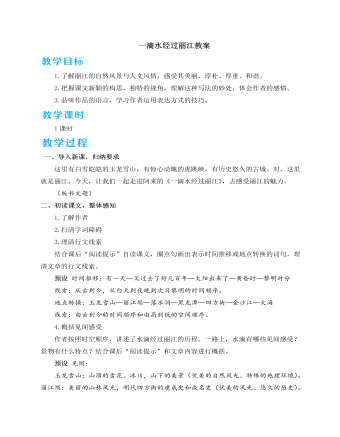
人教部编版语文八年级下册《一滴水经过丽江》教案
【设计意图】从诗意的语言入手,引导学生关注句式节奏、抒情性、叙事性、哲理性,品析语言,从而加深对文本的理解,体会作者对丽江的热爱、赞美之情,体会作者在景物描写中隐含的思想。五、总结存储1.教师总结作者虚构一个旅游者兼讲述者——“一滴水”,用它形成时空线索,串联起丽江的自然风光、历史文化、民俗风情,并着力表现景物背后的丽江的人文精神,来抒发作者对丽江古城与自然美妙融合的赞美之情,对丽江的醇美、和谐、沉静的赞美之情,对传统与现代文明和谐交融的赞美之情,对自然万物的热爱和生命平等的意识。诗意的语言中,有强烈的抒情,有厚重的历史感,有深邃的哲思。这“一滴水”折射出的,是阿来的思想、灵魂。2.布置作业(1)模仿本文的写法,写一篇不少于600字的随笔,选择一个恰当的视角,跨越时空,全面多角度展现家乡的自然风光、历史文化、风土人情。(2)课外阅读阿来的《大地的阶梯》,体会融景物、历史、感悟、思考于一体的游记风格。
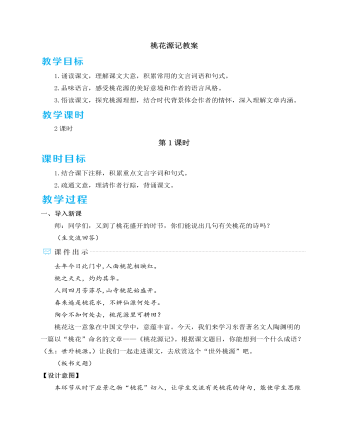
人教部编版语文八年级下册我一生中的重要抉择教案
五、总结存储1.教师总结这篇演讲词,作者用幽默诙谐的语言阐述了自己人生中的一个重要抉择——大力扶植年轻人。作者善于自我调侃,在自我解剖中进行了深入的分析,强调了扶植年轻人的重要性和必要性。演讲中列举了大量名人事例进行论证,使演讲具有很强的说服力。这篇演讲词展示了一位科学家精彩绝伦的语言魅力:不但有科学原理,而且有人生哲理;不但有学术的穿透力,而且有情感的震撼力;不但有理论的清晰度,而且有语言的幽默感——这一切构成了王选演讲的独特风采。我们在体会王选演讲魅力的同时,也领略到了他的人格魅力。2.布置作业(1)人的一生所做的重要抉择,如果与时代和国家紧密相连,意义会更加重大。我们在人生的关键阶段,如选择未来事业时,会做出怎样的抉择?请你写一段200字左右的演讲词,并在小组内演讲交流。(2)课外阅读王选的《我一生中的八个重要抉择》。
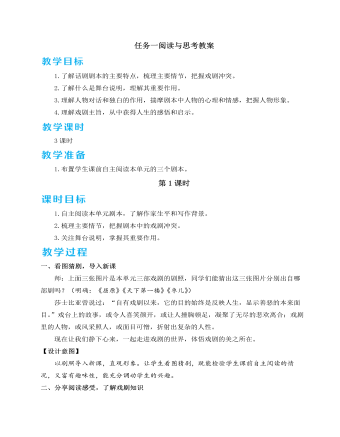
人教部编版语文九年级下册任务一阅读与思考教案
结束语:通过这节课的探究,我们了解了本单元三部戏剧的背景和主旨,相信大家对剧本的理解更深了。下节课,我们就要准备排练戏剧,希望大家课下再好好读读剧本,加深理解。五、布置作业1.课后查阅关于表演的相关资料,了解表演的知识。2.选择最喜欢的一个剧本熟读,并选择其中最喜欢的一个人物,揣摩应如何表演。剧本学习是一项新的教学内容,本次教学设计主要以人物为核心,从三个方面展开:(1)从文本的角度读剧本。从基本的情节入手,通过理解情节中的矛盾冲突来感知人物形象,让学生建立对剧本的基本理解。(2)从表演的角度读剧本。训练学生的朗读能力,引导学生通过台词来理解人物,为下阶段的舞台表演打下基础。(3)从现实的角度读剧本。指导学生认识剧本的现实意义,促进学生的成长。

人教版新目标初中英语八年级下册What were you doing when the UFO arrived教案2篇
(一).知识方面: 1.培养学生能运用过去进行时来描述、谈论过去某个时间正在发生的事情或动作的意识和能力,能就过去某个时间正在发生的动作做出正确的描述。 2.培养学生的想象力和角色扮演的合作能力。 3.培养学生讲述过去发生的事情经过的能力。能正确运用一般过去时来讲述故事。 (二).技能方面: 1.本单元的语言目标是Talk about past events and tell a story(谈论过去的时间和讲述一个故事),围绕这一目标,要涉及句型: What were you doing when the UFO arrived? ----I was sitting in the barber’s chair. The barber was cutting my hair. 因此必须学习standing、studying、cleaning、sleeping、cooking、making、eating、cutting、等表示地点的词,以便为上述句型提供语言材料。2.学习过去进行时的有关知识。Was/were+现在分词,是该时态的表达式。 3.在学习过程中,要区分The boy was walking down the street when the UFO landed.和While the boy was walking down the street, the UFO landed.这两种由when和while引导的状语从句的句型结构。注意它们的不同。

人教版新目标初中英语七年级下册How was your weekend教案2篇
Teaching Goal:1. General aims:Talk about recent past events2. Particular aims:A. Language Focus.Talk about recent past events and think of the past events.B. Language goalsHow was….?It was …What did …do over the weekend?C. Language structures:(1). How was your weekend? I was great. Pay attention to no form.(2). What did you do over the weekend? I played soccer. We went to the beach.D. Useful words and phrases:Words: was, did, went, beach, over, project, test, wasn’t, false, number, geography, spend, week, most, mixture, their, had, little, cook, read, saw, change, everyone, sit, sat, no, anythingPhrases: did one’s homework, played soccer, cleaned my room, went to the beach, played tennis, went to the movies, on Saturday morning, over the weekend, cook … for, what about, do some reading, have a party, talk show, go shoppingE. Grammar language:Present simple past tenseRegular and irregular verbsF. Learning strategies:Tour and holidaysG. Interdiscipinary:H. Emotion and manner:Teaching time: 5 periodsTeaching procedures:Period One教学步骤、时间 教师活动 学生活动 媒体应用Step 1Free talk 3’ Ask some questions like:Who’s on duty today?What’s the weather like? Answer and talk about something.让同学们回答下列问题1. Do you like weekend? (Let some students answer)It takes them three minutes to talk about the question.2. Why do you like weekend? (let the students answer) Most of the students like the weekend此时教师用汉语问:“在周末期间问你干了什么?这句话用英语这么回答?Let the students guess.At last the teacher give them right answer3. What did you do over the weekend?(板书、学习)
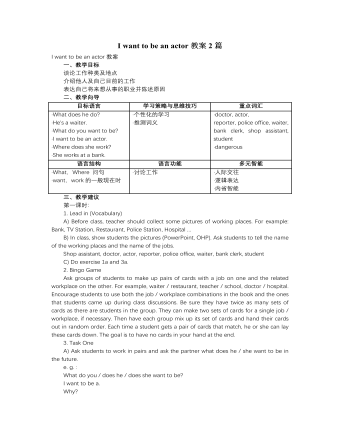
人教版新目标初中英语七年级下册I want to be an actor教案2篇
三、教学建议第一课时:1. Lead in (Vocabulary)A) Before class, teacher should collect some pictures of working places. For example: Bank, TV Station, Restaurant, Police Station, Hospital ...B) In class, show students the pictures (PowerPoint, OHP). Ask students to tell the name of the working places and the name of the jobs.Shop assistant, doctor, actor, reporter, police office, waiter, bank clerk, studentC) Do exercise 1a and 3a.2. Bingo GameAsk groups of students to make up pairs of cards with a job on one and the related workplace on the other. For example, waiter / restaurant, teacher / school, doctor / hospital. Encourage students to use both the job / workplace combinations in the book and the ones that students came up during class discussions. Be sure they have twice as many sets of cards as there are students in the group. They can make two sets of cards for a single job / workplace, if necessary. Then have each group mix up its set of cards and hand their cards out in random order. Each time a student gets a pair of cards that match, he or she can lay these cards down. The goal is to have no cards in your hand at the end.3. Task OneA) Ask students to work in pairs and ask the partner what does he / she want to be in the future.e. g. :What do you / does he / does she want to be?I want to be a.Why?Because it's (adj).B) Vocabulary: Section B, 1a4. Homework 1.2.
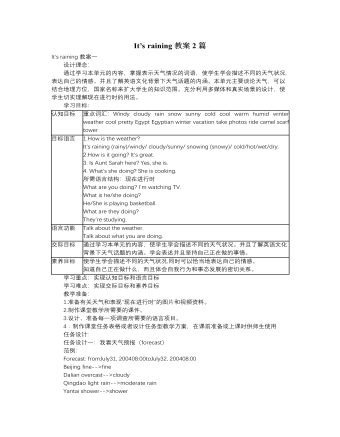
人教版新目标初中英语七年级下册It’s raining教案2篇
1 Each group choose one place to describe and what you are doing in it Choose one place, and describe what they are doing 2 Move around the room and give suggestions Talk about it and write it down 3 Ask one to show their works and act it Choose one of each group to make a report 4 Evaluate the best group and the best reporter Choose the best one Homework Ask your friends their ideal place and write about it教学反思:新课程标准中强调学生在课堂中的主体地位,在综合课中他们的主体地位就更加突出。在各个活动中给不同程度的学生不同层次的任务,让各层面的学生都有表现发挥的机会,从而产生对英语的兴趣。使用照片图片多媒体来辅助教学,效果更好。同时让了解其他国家风景,风俗的同学介绍ideal place,增加学生的背景知知识,实现跨学科交流的目的。教案点评:采用任务型教学模式,在各个活动中给不同程度的学生不同层次的任务,让各层面的学生都有表现发挥的机会,从而产生对英语的兴趣。使用照片图片多媒体来辅助教学,效果更好。让了解其他国家风景,风俗的同学介绍ideal place,增加学生的背景知识,实现跨学科交流的目的。
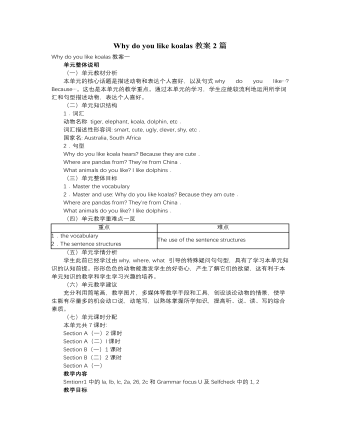
人教版新目标初中英语七年级下册Why do you like koalas教案2篇
单元整体说明(一)单元教材分析本单元的核心话题是描述动物和表达个人喜好,以及句式why do you like…? Because…。这也是本单元的教学重点。通过本单元的学习,学生应能较流利地运用所学词汇和句型描述动物,表达个人喜好。(二)单元知识结构1.词汇动物名称 tiger, elephant, koala, dolphin, etc.词汇描述性形容词: smart, cute, ugly, clever, shy, etc.国家名: Australia, South Africa2.句型Why do you like koala hears? Because they are cute.Where are pandas from? They're from China.What animals do you like? I like dolphins.(三)单元整体目标1.Master the vocabulary2.Master and use: Why do you like koalas? Because they am cute.Where are pandas from? They're from China.What animals do you like? I like dolphins.(四)单元教学重难点一览(五)单元学情分析学生此前已经学过由why, where, what 引导的特殊疑问句句型,具有了学习本单元知识的认知前提。形形色色的动物能激发学生的好奇心,产生了解它们的欲望,这有利于本单元知识的教学和学生学习兴趣的培养。

人教版新目标初中英语八年级下册It’s a nice day, isn’t it教案2篇
"Hello! Welcome to English class! Introduce yourself. Meet your new classmates." That's what the teacher says. What do you say? "Oh no!" It can be difficult talking to new people. But it can be fun, and you can make friends. How do you do it? Make small talk. Small talk is polite conversation. "Wang Nan is a great pingpang player, isn't she?" "I'd love to meet her, wouldn't you?" "It's been raining a lot, hasn't it?" Tag questions are a form of polite speech. To make small talk successfully, you should know how to make them. You should also know what topics to talk about. Try to learn this unit carefully. The next time you're in English class, you'll find out. Making small talk's easy, isn't it? (“你好!欢迎你!请做一下自我介绍。认识一下你的新同学。”通常在课上老师会这样说。你会说什么呢?“噢,不!”与陌生人谈话太困难了。但是这也很有意思,并且你还能交到朋友。你该怎么做呢?闲聊。闲聊指得是礼貌的对话。“王楠是一个很棒的乒乓球运动员,不是吗?”“我希望自己能认识她,你呢?“今年的雨水很多,不是吗?”反意疑问句是一种礼貌用语。为了使得谈话成功,你应该知道怎样去进行闲聊。你还应该知道与不同的人该谈论什么样的话题。认真的学习这个单元吧,下次在英语课上,你会发现与大家展开谈话是一件很容易的事情,不信我们来试试。)

人教版新目标初中英语八年级下册He said I was hard-working教案2篇
This activity introduces some new vocabulary and provide oral practice using the target language.Task 1 . Ask four students to stand in front of the class, and the teacher asks them the following questions as a reporter.1.What are you going to do when you grow up?2.What are you going to do next week?3.What are going to do after school?The students will give different answers, then ask a good student to report what they said.I am going to e a doctor.What did she say?----------She said she was going to be a doctor.I am going to have a party on Friday night.What did he say?-------He said he was going to have a party on Friday night.I am going to do my homework.What did she say ?------ She said she was going to do her homework.I am going home after school.What did she say?-----She said she was going home after school.Say In this unit we are going to learn to use words like to report what someone said.Task 2. Read the instructions. Then ask a student to read the four questions. And write the words on the Bb. Explain what soap opera is.Task 3. Ask the students to Look at the pictures, point out the TV screens in the picture. Ask one girl to read what Marcia said.What did Marcia say? She said She said she was having a surprise party for Lana on Friday night. Repeat the other pictures in the same way.Activity3. Listen and number the pictures in activity 1a.

人教版新目标初中英语九年级下册We’re trying to save the manatees教案2篇
本单元主要围绕着有关濒临灭绝的动物这一话题,学习了应该怎样保护我们的环境,以及就某一问题展开辩论。目标提示语言目标能够运用所学知识,就某一问题展开辩论。认知目标1、复习一些语法:现在进行时、一般现在时、用used to 表示一般过去时、现在完成时、一般过去时的被动语态。2、学会表达同意和不同意。3、学会以下基本句型:We’re trying to save the manatees.Manatees eat about 100 pounds of food a day.There used to be a lot of manatees.In 1972,it was discovered that they were endangered.Some of the swamps have become polluted.情感目标了解一些濒临灭绝的动物的生活习性和濒临灭绝的原因,教育学生应该如何保护环境。教学提示充分利用多媒体等教学设备,创设与本课话题相关的情境,如各种不同种类的动物、动物园以及有关环境的画画等等。围绕着本单元的教学目标,设计一些贴近学生实际的教学任务,如让学生谈论自己最喜欢的动物,如何拯救濒危动物,如何保护环境等等。让学生根据所学知识,就动物园是否对动物有利以及其他的话题进行辩论。

人教版新目标初中英语七年级下册Where is the post office教案2篇
Period 2 (3a----Section B 2c)Preview(Pre-task): Key points: What laAdd another information about their pen pals----their language on the cardnguage does she/he speak?She/He speaks....Does she/he have any brothers and sisters? Does she/he speak English?Preview(Pre-task): Add another information about their pen pals----their language on the cardKey points: What language does she/he speak?She/He speaks....Does she/he have any brothers and sisters? Does she/he speak English?Step 1 Revision1.Revisionand dictation of the new words 2.Revise the drills they learned yesterday.(by pairwork and grammar exercise)Step 2 Leading-inT has a conversation with one student. The conversation is following:---Do you have a pen pal?---Yes, I do.---What's your pen pal's name? ---His/Her name is....---Where is your pen pal from? ---He/She is from...---Where does he/she live? ---He/She lives in....---What language does he/she speak?He/She speaks...Write the new words on the Bb. They are following: EnglishChineseJapaneseFrenchStep 3 LearnLearn the new words with the whole class.Finish 3a with the students3b Pairwork T still does an example with one student Then the Ss practise in pairs. The example is following:--Curry Muray is my pen pal. He is from the United States.---What language does he speak?

人教版新目标初中英语七年级下册Don’t eat in class教案2篇
Don’t fight. =You can’t fight. (板书,教读)教师把这些句子板书在黑板上,并请学生大声整齐地读祈使句和“can’t”句型,并让学生注意两种句型表达形式的不同和转换,“Don’t …=You can’t…”;并对学生说:These are our school rules. (板书,教读) You can’t break the school rules. Don’t break the school rules.(板书,教读)步骤3 :Practicea. T: Now, each of the students is breaking one of these rules.Please finish 1a.学生看图,完成1a的内容,检查答案并大声朗读校规。b. 听录音,完成1b,选出四位学生都违反了哪条校规;听之前,学生要读会英文名。c. 请两位学生朗读1c部分的句型;要求学生两人一组对话表演,SA扮演外校转来新生,SB告知本校校规。(学生可经过讨论,多说出他们想到的校规,不必只限于书上;教师应给予帮助)2) 第二课时(2a~4)步骤1 :warming up of revisionT: What are the rules at your school?学生使用“can”或祈使句表达各条校规;其中老师可引出“eat in the cafeteria outside”的表达。步骤2 :Practicea.T: Christina is an exchange student. She doesn’t know the rules. Let’s listen, what activities they’re talking about?学生听第一遍时,完成2a;第二遍时,完成2b;b. 请学生领读2c部分,看着2a完成的表格,理解2c活动的要求;分成小组针对2a进行问答;
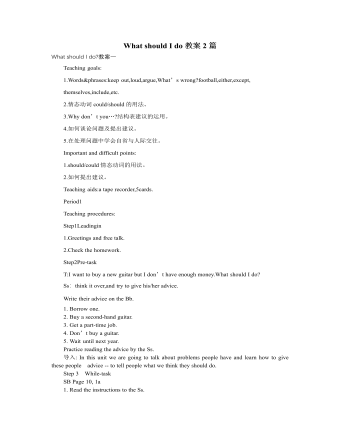
人教版新目标初中英语八年级下册What should I do教案2篇
说明:在帮Li Lei提建议的同时,教育学生如何学好英语。第三课时教学目标1. 语言目标:a) 词汇: Original, in style, haircut, the same as.b) 语言结构:My friend wears the same clothes and has the same haircut as I do.2. 能力目标:大多数学生能够谈论自己喜欢哪种服装,提高查找信息的能力。3. 情感目标:学会如何与朋友相处,要有自己对时尚的看法。教学重点掌握一些重要词汇。教学难点学会谈论问题,并能提出书面建议。◆教学突破首先针对Erin的问题,提出个人的建议,模仿2c部分的对话展开双人交际Pair-work;听老师诵读3a部分的信件,并找出LEFT OUT的问题所在;学生完成3b部分的内容,给Left Out提出书面的建议;学以口头形式提出自己目前存在的某个问题,讲给大家听,让同学们给自己提出一个建议,并作笔录;学生两、三个人分成一组,随意性地进行口语交际,谈论P14的第4部分的某个问题,相互交换意见。
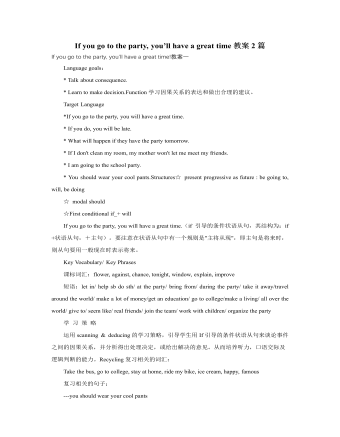
人教版新目标初中英语八年级下册If you go to the party, you’ll have a great time教案2篇
区分宾语从句、定于从句和状语从句宾语从句和状语从句,都叫做主从复合句。宾语从句主要是中考必考的,是初中阶段必掌握的从句,宾语从句主要是掌握三要素,所谓宾语从句,就是宾语在主从复合句当中充当宾语的一个句子,叫做宾语从句。主句的谓语动词是及物动词,后面如果是词或者是短语的话,是简单句,如果是句子的话,肯定是宾语从句。I know that he good at English.就是宾语从句,三要素,一要素是要注意连词,连词一共学了三类连词,一类连词是that口语当中可以省略,就像刚才说的那一句,I hear he is good at English.还有疑问代词、疑问副词,how where when,疑问代词、疑问副词。还有一类连词weather是否的意思,不是状语从句当中的如果,这一定要和如果区分开,这是是否。I don't know if he interested at English。宾语从句要注意if是连词。第二要素是语序,要用陈述举语序。比如说你家有几口人,我们都说How many people are there in you family?但是这是简单句,一旦说成宾语从句,你可以告诉我你家有几口人吗?Could you tell me how many people there are in you family ?
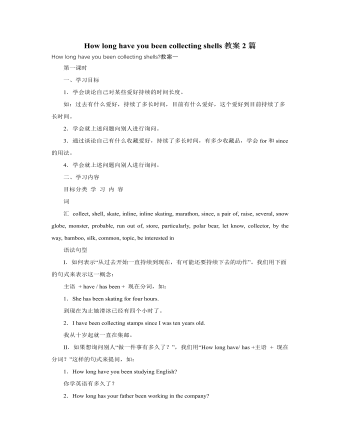
人教版新目标初中英语八年级下册How long have you been collecting shells教案2篇
Step Ⅱ Show the new words on the screen and teach the new words. Read the new words to students and ask them to repeat.Step Ⅲ 3aThis activity introduces new vocabulary and provides reading practice using the target language.In this activity first look at the four pictures.T: What can you see in the pictures?Ss: Four snow globes.T: Right. There are four snow globes in the pictures. And what are they?Ss: They are a monster, two polar bears, two penguins and a birthday cake.Write these words on the blackboard: snow globe; monster; polar bear; penguin and birthday cake. Read them to the class and ask students to repeat each one. Make sure students understand each word.Use a computer to show the E-mail message on the screen and read the message to students.Get students to read the e-mail on their own, and then draw lines connecting each snow globe and its description.Correct the answers.AnswersA line should connect each snow globe picture with the words that describe it in the letter.Step Ⅳ 3bThis activity provides writing practice using the target language.First review Activity 2a on Page 47.Then ask students to complete the message according to Activity 2a.Some partial sentences are given to students. Write about one person's collection.When students work, walk around the room checking the progress and offering help as needed.When they finish, ask some students to read their messages to the class.
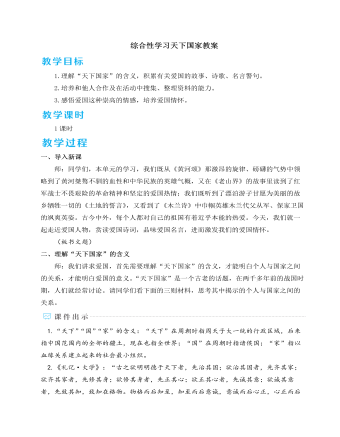
人教部编版七年级下册综合性学习天下国家教案
我荣幸地以中华民族一员的资格,而成为世界公民。我是中国人民的儿子。我深情地爱着我的祖国和人民。 ——邓小平一个人只要热爱自己的祖国,有一颗爱国之心,就什么事情都能解决。什么苦楚,什么冤屈都受得了。 ——冰心做人最大的事情是什么呢?就是要知道怎么样爱国。 ——孙中山能够献身于自己祖国的事业,为实现理想而斗争,这是最光荣不过的事情了。——吴玉章外国爱国名言示例:我们为祖国服务,也不能都采用同一方式,每个人应该按照资禀,各尽所能。——歌德纵使世界给我珍宝和荣誉,我也不愿离开我的祖国。因为纵使我的祖国在耻辱之中,我还是喜欢、热爱、祝福我的祖国。 ——裴多菲我重视祖国的利益,甚于自己的生命和我所珍爱的儿女。 ——莎士比亚我无论做什么,始终在想着,只要我的精力允许我的话,我就要首先为我的祖国服务。 ——巴甫洛夫
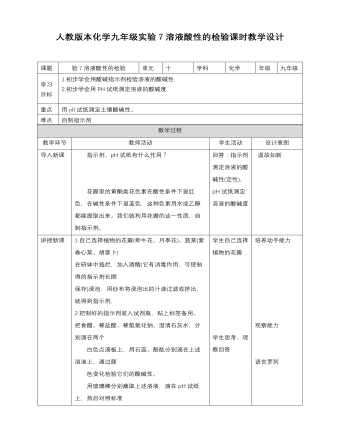
初中化学人教版九年级下册《实验活动7溶液酸碱性的检验》教案
1.自己选择植物的花瓣(牵牛花、月季花)、蔬菜(紫卷心菜、胡萝卜) 在研钵中捣烂,加入酒精(它有消毒作用,可使制得的指示剂长期 保存)浸泡,用纱布将浸泡出的汁液过滤或挤出,就得到指示剂, 2.把制好的指示剂装入试剂瓶,贴上标签备用。 把食醋、稀盐酸、稀氢氧化钠、澄清石灰水,分别滴在两个 白色点滴板上,用石蕊、酚酞分别滴在上述溶液上,通过颜 色变化检验它们的酸碱性。 用玻璃棒分别蘸取上述溶液,滴在pH试纸上,然后对照标准 比色卡比较,得出pH值,也就是酸碱度。 把上述溶液滴在白色点滴板上,用滴管吸一下你自制的指示剂,滴在滴板的溶液里,观察颜色变化,每用一种指示剂,换一下滴板的溶液。 把所得到颜色变色变化的信息和pH值数据填入教材第70页的表中。 3.取少量土壤样品,将土壤样品与蒸馏水按1∶5的质量比在烧杯中混合, 充分搅拌后静置,用玻璃棒蘸澄清的液体,滴在pH试纸上,然后对照 标准比色卡记录读数。
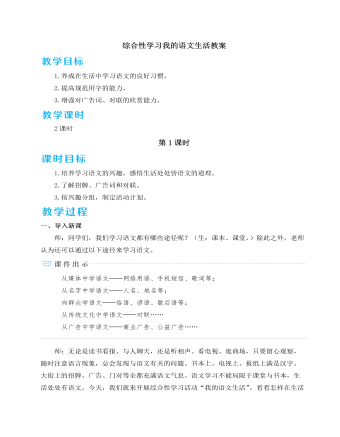
人教部编版七年级下册综合性学习我的语文生活教案
1.培养学习语文的兴趣,感悟生活处处皆语文的道理。2.了解招牌、广告词和对联。3.按兴趣分组,制定活动计划。 一、导入新课师:同学们,我们学习语文都有哪些途径呢?(生:课本、课堂。)除此之外,老师认为还可以通过以下途径来学习语文。从媒体中学语文——网络用语、手机短信、歌词等;从名字中学语文——人名、地名等;向群众学语文——俗语、谚语、歇后语等;从传统文化中学语文——对联……从广告中学语文——商业广告、公益广告…… 师:无论是读书看报、与人聊天,还是听相声、看电视、逛商场,只要留心观察,随时注意语言现象,总会发现与语文有关的问题。书本上、电视上、报纸上满是汉字。大街上的招牌、广告、门对等全都充满语文气息。语文学习不能局限于课堂与书本,生活处处有语文。今天,我们就来开展综合性学习活动“我的语文生活”,看看怎样在生活中学习语文。
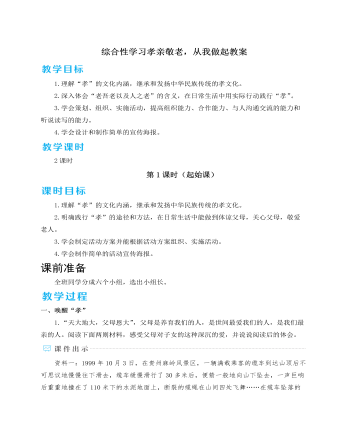
人教部编版七年级下册综合性学习孝亲敬老,从我做起教案
本环节旨在通过展示、评价践行“孝亲敬老”的活动成果,深化 “孝”的境界,培养学生回报家人、关爱他人的美德。展示过程中,学生的语言表达能力、诵读能力、搜集和整理资料的能力、写作能力得到了提升,同时也增强了自信心。二、谈“孝”心1.在这为期一周的践行“孝”的活动中,你有哪些体会和感受?请与大家分享。(生小组内交流,小组代表发言)预设 示例一:在这次践行“孝”的活动中,我做了许多表达孝心的事情,从中体会到了父母工作的艰辛、赚钱的不易,更能体谅他们了。我也了解到平时我不经意说的话伤害了父母,让父母担忧难过了。现在我与父母之间的关系变得更加融洽,父母对我的一些事情也能够理解了,我发现只要我们对父母多一些尊重和理解,他们就会非常开心。示例二:我在采访爷爷奶奶时,了解到祖辈们的人生经历和具体事迹,被他们身上的一些精神品质所感动,更加钦佩他们了。这次的采访活动增强了我与家人之间的沟通,增进了我与家人之间的情感交流,也让我进一步了解了我们家族的一些历史,让我有了为家族努力奋斗的使命感。





